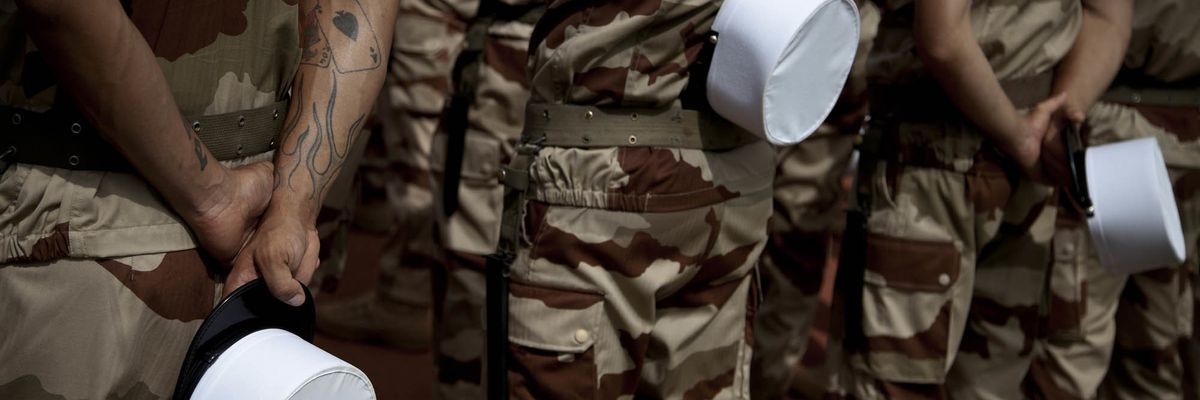In a widely-expected move, French President Emmanuel Macron announced a withdrawal of his forces from conflict-torn Mali on Thursday. Such a withdrawal would certainly represent a bitter end to a nine-year deployment and signal a failure of France's overall counterinsurgency project in the region. But don't expect a full departure, at least not yet.
French action in Mali began as a quick mission (Operation Serval) to topple a jihadist proto-state, but then became bogged down as an open-ended counterterrorism mission (Operation Barkhane) confronting an interminable insurgency. Meanwhile, Mali’s politics lurched from bad to worse. An ineffective civilian president, overthrown in an August 2020 coup, was replaced by a clique of officers who now appear very reluctant to leave power. France’s withdrawal, which Macron announced in a press conference after a meeting with European Union-African Union summit leaders, occurs amid pronounced diplomatic tensions between Bamako and Paris, including the expulsion of France’s ambassador in January.
The French press is now full of analyses of what went wrong with the French mission in Mali. Analysts underline factors such as the low levels of troops deployed, the lack of an ultimate military objective (beyond a parade of strikes against senior jihadists), the frequent misalignment of priorities between Paris and Bamako, and the growing mistrust among Sahelian citizens regarding French operations. One prominent French analyst, surveying the history of French deployments in postcolonial Africa (largely in France’s own former colonies) writes, “the French army can play firefighter but not police.” In other words, quick French actions can tilt the balance in a civil war in favor of France’s preferred victor, but extended counterinsurgency campaigns are likely to falter.
This conclusion will sound quite familiar to anyone who has followed America’s misadventures in Afghanistan and Iraq. There is, moreover, a blame game now underway that resembles discussions of American failures in those two wars. Such discussions often pin primary responsibility on the “host country” — either on its weak military, its corrupt civilian leaders, or both. Yet the causes of French (and American) military-political failures are structural, for at least two reasons. First, local citizens often come to perceive open-ended deployments as unwelcome foreign occupations, undermining the foreign forces’ political objectives.
Second, intensive counterterrorism campaigns targeting top leaders are ill-structured for addressing the factors driving the recruitment of the rank-and-file to jihadist organizations. These factors include the crisis of pastoralism in the region, the anger caused by security force abuses against jihadists, the relative appeal of jihadists’ version of law-and-order within conflict zones, and the desire for a new economic order in regions long dominated by an oligarchic local elite.
The debate matters because France’s military and counterterrorism role in the Sahel is far from over. Press coverage of France’s troop withdrawal exaggerates the degree to which the French are likely to pull back. In June, after Macron announced the imminent end of Barkhane “as an exterior operation,” news outlets often inadvertently suggested that it was Barkhane or nothing — all while France was building up a pan-European special forces group called Task Force Takuba as a loose replacement for Barkhane.
Now that both Barkhane and Takuba are shifting away from Mali, headlines sometimes imply that France’s Sahelian venture is wrapping up — but the more likely outcome is that France will shift forces to Mali’s neighbors Burkina Faso and Niger.
Indeed, Barkhane has been a Sahel-wide mission since its launch in 2014. Counterterrorism strikes on Malian soil may well continue, including a degree of U.S. involvement that is sometimes hard to gauge (the extent of the American military presence in and around Mali is difficult to assess, and when things go wrong — from scandals to setbacks — it appears that there are larger deployments than the Pentagon had previously acknowledged).
Local actors (the current junta in Bamako specifically, and the Malian military, and civilian elite more broadly) are part of Barkhane’s failures in Mali, but only part. Indeed, it seems that France is departing from Mali having learned relatively few lessons. Mali’s current leadership may be particularly acerbic and confrontational vis-à-vis France, and Mali’s problems are arguably more severe than those of its neighbors (relatively isolated diplomatically, host to a counterproductive deployment of Russian mercenaries, and under crushing regional economic sanctions, Mali is at a low point), but Burkina Faso and Niger are also in very bad shape.
To take just one metric, in Burkina Faso alone, over 1.5 million people — approximately 7 percent of the population — are currently displaced. The recent coup in Burkina Faso also indicates that the combination of presidential overreach, endemic insecurity, corruption, popular discontent, and anti-French sentiment that precipitated Mali’s 2020 coup, is not at all unique to that country. Confronting a region-wide crisis, France needs new ideas, and not just new bases.
What happens next in Mali will, prismatically, be open to all sides to interpret as they like. Any degradation in Mali’s security can now be blamed on the departure (however meaningful) of French forces— yet could equally be blamed on the country’s already poor security trajectory even before the French drawdown.
As French forces depart, meanwhile, Malian authorities still face severe constraints on what they can do and change. Under sanctions and facing intensive diplomatic pressure, Mali’s authorities (unsympathetic though they may be to many outsiders) will be hard-pressed to meet the dizzying array of challenges now confronting them, ranging from simply paying civil servants to the political challenge of rerouting a transition to civilian rule to the uncharted territory of possible negotiations with jihadists (which may have already begun).
The situation in Mali may well now worsen considerably, but that does not in and of itself prove that an open-ended French presence was good or necessary; after all, had France’s strategy (however crude) been succeeding, things would not have deteriorated so badly that France had to leave Mali with essentially no accomplishments other than a list of dead jihadists.
















